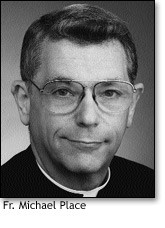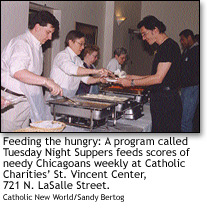|
|
Works of mercy
Catholic Charities USA, Catholic Health Association celebrate faith, commitment
By Michelle Martin
Staff writer
When Chicago welcomes 1,000 leaders from Catholic social service and health care agencies next month, it will offer them a chance to explore a common history and a common mission, played out in two very different ministries.
 “Celebration 275: United in Faith, Committed to Justice,” the first ever joint national meeting of Catholic Charities USA and the Catholic Health Association, hearkens back to 12 Ursuline nuns who came from France to New Orleans in 1827 and started schools, offered service to the poor and worked in hospitals. Catholic health care workers and social service providers both count the sisters as their spiritual foremothers. “Celebration 275: United in Faith, Committed to Justice,” the first ever joint national meeting of Catholic Charities USA and the Catholic Health Association, hearkens back to 12 Ursuline nuns who came from France to New Orleans in 1827 and started schools, offered service to the poor and worked in hospitals. Catholic health care workers and social service providers both count the sisters as their spiritual foremothers.
Finding ways to work collaboratively makes sense pragmatically in a time when health care organizations are finding ways to reach out into the community and social service organizations are dealing with issues like behavioral health, said Father Michael Place, a priest of the Archdiocese of Chicago and president and CEO of the Catholic Health Association.
Theologically, it also makes sense, Place said.
“If we think about the church as a communion, we have a responsibility to be more collaborative in bringing about the reign of God,” he said.
Father Bryan Hehir, president of Catholic Charities USA, said church institutions that work in the area of social services and policy—including Catholic education and international relief and development, along with Catholic Charities and health care—often have similar concerns and clientele.
 “You see not only the potential of what each can do on its own, you also see the fault lines that run through all of them,” Hehir said. “I see these distinct agencies as a way to embrace Catholic social vision as it applies to different areas of human need. But often people have needs in two or three areas.” “You see not only the potential of what each can do on its own, you also see the fault lines that run through all of them,” Hehir said. “I see these distinct agencies as a way to embrace Catholic social vision as it applies to different areas of human need. But often people have needs in two or three areas.”
Passionist Father Donald Senior, scheduled to speak to the assembly on the first day of the Aug. 3-5 meeting, called a joint meeting for the two organizations “brilliant.”
“They are very different, but they both are expressions of the Catholic commitment to the works of mercy,” said Senior, president of Catholic Theological Union in Chicago.
The joint meeting at the Sheraton Chicago Hotel and Towers will be preceded by meetings for Catholic Charities USA, the umbrella organization for more than 1,640 local agencies and institutions that provide help for more than 9 million people a year, and followed by meetings for the Catholic Health Association, which represents more than 2,000 health care sponsors, systems, facilities, health plans and related organizations.
The Archdiocese of Chicago, home of the largest Catholic Charities agency and the biggest collection of Catholic hospitals in the United States, provides an ideal backdrop for the meeting, said Father Michael Boland, administrator of Catholic Charities of the Archdiocese of Chicago.
“I hope they would leave here with maybe a deeper sense of pride because of what Catholic Charities has done. They would get a sense of the staff and the board and their commitment to service,” Boland said. He is looking forward to getting ideas on how Catholic Charities and health care institutions can work together more, he said.
Place said the meeting will offer many examples.
“There’s a lot more that’s been happening than people are aware of,” he said.
Discussions will focus on the New Covenant initiative, started in 1995 to look for ways institutions could collaborate at the local level, and at a joint study on collaboration funded by Catholic Charities and the CHA.
Other highlights of the joint session will include an address by Jim Towey, deputy assistant to President George W. Bush and director of the Office of Faith-Based and Community Initiatives. President Bush, who had been invited to speak to the assembly in person, will instead send a videotaped message. Both presentations will take place at the general session the morning of Aug. 4. Cardinal George will celebrate Mass the same morning.
Towey, a Catholic, was appointed to lead the White House’s faith-based initiative in February. Previously, he served for 12 years as legal counsel to Mother Teresa and he spent a year as a full-time volunteer in her home for people with AIDS in Washington D.C.
On Aug. 3, those who attend will hear from Father Bryan Massingale of St. Francis Seminary in Milwaukee and Margaret O’Brien Steinfels, editor of Commonweal, on religion in the public square.
The same afternoon Senior and Mercy Sister Doris Gottemoeller will speak about the role of spirituality in Catholic ministry.
“The work of Catholic Charities and the Catholic Health Association is so in tune with the basics of Christian life and Christian ministry,” said Senior, who will examine the Biblical stories of Jesus’ ministry to the sick and outcast, while Gottemoeller reflects on the more theological and practical aspects ministry.
The healing stories show Jesus drawing in people from the fringes of society, often in the face of disapproval from the people around him, even his own disciples.
Those working in health care and social services today face their own challenges, whether in terms of financial pressure, red tape and paperwork or accommodating the differing viewpoints of clients and colleagues.
“We want to find the grace in the midst of all this challenge,” Senior said. “Deep down, the motivations people (in Catholic health care and social service leadership) have are built on the image of Jesus the healer.”
Members of the two organizations share not only that spirituality, but a commitment to working in the world, providing care to people of all faiths, often in cooperation or with funding by government programs—traits which make it all the more important to find ways to maintain a Catholic identity.
The identity question has really arisen in the last 10 years, as agencies founded to serve Catholics became more pluralistic in their missions in the wake of Vatican II, Hehir said.
“We are clearly called by the church to serve the whole society,’ Hehir said. “But you want to make sure you know where you stand, where you are rooted.”
Struggles with funding in a time of a slowing economy and challenges to the church’s credibility after months of public scandals about sexual abuse by priests will be likely topics of conversation among participants.
“This is a hard time to do anything in the church,” Hehir acknowledged. “But you’ve got to keep doing things, knowing that it’s hard. No one doubts that the church has a huge task in front of it, both with its own people and with society at large.”
But leaders said such difficult times can bring people together and inspire them to go back to the ideals that brought them to a life of service.
“When people of good will come together and focus on their deepest ideals and most basic motivations, a reinvigoration can occur,” Senior said. “These are two dimensions of the church’s life of which the church can be very proud. We have dying and rising at the same time. It also might be good for the public to remember the extraordinary commitment the church has to health care and social services.”
Top
Front Page | Digest | Cardinal | Interview
Classifieds | About Us | Write Us | Subscribe | Advertise
Archive | Catholic Sites | New World Publications | Católico | Directory | Site Map
|





